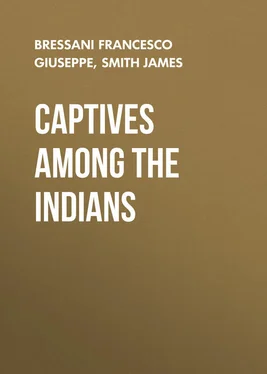James Smith - Captives Among the Indians
Здесь есть возможность читать онлайн «James Smith - Captives Among the Indians» — ознакомительный отрывок электронной книги совершенно бесплатно, а после прочтения отрывка купить полную версию. В некоторых случаях можно слушать аудио, скачать через торрент в формате fb2 и присутствует краткое содержание. Жанр: foreign_antique, foreign_prose, на английском языке. Описание произведения, (предисловие) а так же отзывы посетителей доступны на портале библиотеки ЛибКат.
- Название:Captives Among the Indians
- Автор:
- Жанр:
- Год:неизвестен
- ISBN:нет данных
- Рейтинг книги:5 / 5. Голосов: 1
-
Избранное:Добавить в избранное
- Отзывы:
-
Ваша оценка:
- 100
- 1
- 2
- 3
- 4
- 5
Captives Among the Indians: краткое содержание, описание и аннотация
Предлагаем к чтению аннотацию, описание, краткое содержание или предисловие (зависит от того, что написал сам автор книги «Captives Among the Indians»). Если вы не нашли необходимую информацию о книге — напишите в комментариях, мы постараемся отыскать её.
Captives Among the Indians — читать онлайн ознакомительный отрывок
Ниже представлен текст книги, разбитый по страницам. Система сохранения места последней прочитанной страницы, позволяет с удобством читать онлайн бесплатно книгу «Captives Among the Indians», без необходимости каждый раз заново искать на чём Вы остановились. Поставьте закладку, и сможете в любой момент перейти на страницу, на которой закончили чтение.
Интервал:
Закладка:
While we remained here I left my pouch with my books in camp, wrapped up in my blanket, and went out to hunt chestnuts. On my return to camp my books were missing. I inquired after them, and asked the Indians if they knew where they were; they told me that they supposed the puppies had carried them off. I did not believe them, but thought they were displeased at my poring over my books, and concluded that they had destroyed them, or put them out of my way.
After this I was again out after nuts, and on my return beheld a new erection, composed of two white-oak saplings, that were forked about twelve feet high, and stood about fifteen feet apart. They had cut these saplings at the forks, and laid a strong pole across, which appeared in the form of a gallows; and the poles they had shaved very smooth, and painted in places with vermilion. I could not conceive the use of this piece of work, and at length concluded it was a gallows. I thought that I had displeased them by reading my books, and that they were about putting me to death. The next morning I observed them bringing their skins all to this place, and hanging them over this pole, so as to preserve them from being injured by the weather. This removed my fears. They also buried their large canoe in the ground, which is the way they took to preserve this sort of a canoe in the winter season.
As we had at this time no horse, every one got a pack on his back, and we steered an east course about twelve miles and encamped. The next morning we proceeded on the same course about ten miles to a large creek that empties into Lake Erie, betwixt Canesadooharie and Cayahoga. Here they made their winter cabin in the following form: they cut logs about fifteen feet long, and laid these logs upon each other, and drove posts in the ground at each end to keep them together; the posts they tied together at the top with bark, and by this means raised a wall fifteen feet long and about four feet high, and in the same manner they raised another wall opposite to this, at about twelve feet distance; then they drove forks in the ground in the centre of each end, and laid a strong pole from end to end on these forks; and from these walls to the poles they set up poles instead of rafters, and on these they tied small poles in place of laths; and a cover was made of lynn-bark, which will run 2 2 Peel.
even in the winter season.
It was some time in December when we finished this winter-cabin; but when we had got into this comparatively fine lodging another difficulty arose – we had nothing to eat. While I was travelling with Tontileaugo, as was before mentioned, and had plenty of fat venison, bear's meat, and raccoons, I then thought it was hard living without bread or salt; but now I began to conclude that, if I had anything that would banish pinching hunger, and keep soul and body together, I would be content.
While the hunters were all out, exerting themselves to the utmost of their ability, the squaws and boys (in which class I was) were scattered out in the bottoms, hunting red haws, black haws, and hickory nuts. As it was too late in the year we did not succeed in gathering haws, but we had tolerable success in scratching up hickory-nuts from under a light snow, and these we carried with us lest the hunters should not succeed. After our return the hunters came in, who had killed only two small turkeys, which were but little among eight hunters and thirteen squaws, boys, and children; but they were divided with the greatest equity and justice; every one got their equal share.
The next day the hunters turned out again, and killed one deer and three bears. One of the bears was very large and remarkably fat. The hunters carried in meat sufficient to give us all a hearty supper and breakfast. The squaws and all that could carry turned out to bring in meat; every one had their share assigned them, and my load was among the least; yet, not being accustomed to carrying in this way, I got exceedingly weary, and told them my load was too heavy; I must leave part of it and come for it again. They made a halt, and only laughed at me, and took part of my load, and added it to a young squaw's, who had as much before as I carried.
This kind of reproof had a greater tendency to excite me to exert myself in carrying without complaining than if they had whipped me for laziness. After this the hunters held a council, and concluded that they must have horses to carry their loads; and that they would go to war, even in this inclement season, in order to bring in horses.
Tontileaugo wished to be one of those who should go to war; but the votes went against him, as he was one of our best hunters; it was thought necessary to leave him at this winter-camp to provide for the squaws and children. It was agreed upon that Tontileaugo and three others should stay and hunt, and the other four go to war.
They then began to go through their common ceremony. They sung their war-songs, danced their war-dances, etc. And when they were equipped they went off singing their marching-song and firing their guns. Our camp appeared to be rejoicing; but I was grieved to think that some innocent persons would be murdered, not thinking of danger.
After the departure of these warriors we had hard times; and though we were not altogether out of provisions, we were brought to short allowance. At length Tontileaugo had considerable success, and we had meat brought into camp sufficient to last ten days. Tontileaugo then took me with him in order to encamp some distance from this winter-cabin, to try his luck there. We carried no provisions with us; he said he would leave what was there for the squaws and children, and that we could shift for ourselves. We steered about a south course up the waters of this creek, and encamped about ten or twelve miles from the winter-cabin. As it was still cold weather, and a crust upon the snow, which made a noise as we walked, and alarmed the deer, we could kill nothing, and consequently went to sleep without supper. The only chance we had, under these circumstances, was to hunt bear-holes; as the bears, about Christmas, search out a winter lodging-place, where they lie about three or four months without eating or drinking. This may appear to some incredible, but it is well known to be the case by those who live in the remote western parts of North America.
The next morning early we proceeded on, and when we found a tree scratched by the bears climbing up, and the hole in the tree sufficiently large for the reception of the bear, we then felled a sapling or small tree against or near the hole, and it was my business to climb up and drive out the bear, while Tontileaugo stood ready with his gun and bow. We went on in this manner until evening without success. At length we found a large elm scratched, and a hole in it about forty feet up, but no tree nigh suitable to lodge against the hole. Tontileaugo got a long pole and some dry rotten wood, which he tied in bunches with bark; and as there was a tree that grew near the elm, and extended up near the hole, but leaned the wrong way, so that we could not lodge it to advantage, to remedy this inconvenience he climbed up this tree and carried with him his rotten wood, fire, and pole. The rotten wood he tied to his belt, and to one end of the pole he tied a hook and a piece of rotten wood, which he set fire to, as it would retain fire almost like punk, and reached this hook from limb to limb as he went up. When he got up with his pole he put dry wood on fire into the hole; after he put in the fire he heard the bear snuff, and he came speedily down, took his gun in his hand, and waited until the bear would come out; but it was some time before it appeared, and when it did appear he attempted taking sight with his rifle; but it being then too dark to see the sights, he set it down by a tree, and instantly bent his bow, took hold of an arrow, and shot the bear a little behind the shoulder. I was preparing also to shoot an arrow, but he called to me to stop, there was no occasion; and with that the bear fell to the ground.
Читать дальшеИнтервал:
Закладка:
Похожие книги на «Captives Among the Indians»
Представляем Вашему вниманию похожие книги на «Captives Among the Indians» списком для выбора. Мы отобрали схожую по названию и смыслу литературу в надежде предоставить читателям больше вариантов отыскать новые, интересные, ещё непрочитанные произведения.
Обсуждение, отзывы о книге «Captives Among the Indians» и просто собственные мнения читателей. Оставьте ваши комментарии, напишите, что Вы думаете о произведении, его смысле или главных героях. Укажите что конкретно понравилось, а что нет, и почему Вы так считаете.












